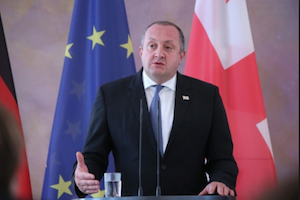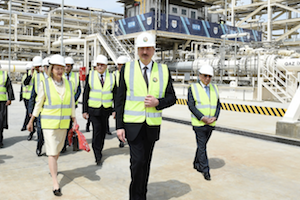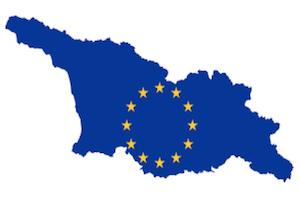Connecting Eurasia: Is Cooperation Between the EU, China and Russia Possible in Central Asia?
Connecting Eurasia: Is Cooperation Between the EU, China and Russia Possible in Central Asia?
By: Fabienne Bossuyt
Given the ongoing tensions between the EU and Russia, only few experts will give serious thought to the prospect of trilateral cooperation on connectivity between the EU, China and Russia in Central Asia. However, as China further embarks on implementing its Belt and Road Initiative (BRI) and remains firmly set on pursuing the ambitious goal of connecting China overland with Europe, the EU and Russia – as indispensable stakeholders for any Eurasian land bridge to successfully materialize – have been developing policy responses to China’s initiative that reveal an unexpected willingness to cooperate. In scrutinizing the likelihood of cooperation on connectivity between the EU, China and Russia in Central Asia, this article identifies the common interests between the three sides, and highlights to what extent cooperation between them is possible in Central Asia. In doing so, the article points to the main opportunities while outlining the main bottlenecks, which mostly stem from these actors’ diverging beliefs and approaches to connectivity and development. After touching upon the scope for cooperation between the EU, Russia and China, the remaining part of the article focuses on possible cooperation between the EU and China.
Converging Interests
Although trilateral cooperation between the EU, China and Russia on connectivity in Central Asia seems practically impossible in the short term due to the ongoing tensions between the EU and Russia, there does appear to be scope for cooperation between the three. The three sides have a common interest in advancing connectivity along the two transport corridors between China and Europe that pass through Russia. Of those two corridors, the New Eurasian Land Bridge passes through Central Asia, namely through Kazakhstan, while the China-Central Asia corridor is supposed to link up to the New Eurasian Land Corridor. Both the EU and China are aware that they need Russia’s support and involvement if these transport corridors are to be successfully completed.
The EU even recognizes this formally. In the EU’s strategy for Central Asia, which has just been redesigned, connectivity will be identified as one of the areas where possible synergies with Russia should be established. However, it remains to be seen how this will be achieved in concrete terms. Despite this common interest between the EU and Russia, there remains a profound lack of political willingness on both sides to cooperate.
This is different for Russia and China. They have already formally aligned themselves by linking up the Eurasian Economic Union EAEU) to the BRI, although in terms of practical implementation on the ground, progress remains limited.
Russia would also like the EU to formally engage with the EAEU. This would feed into Russia’s conception of the Greater Eurasian Partnership, stretching from Lisbon to Vladivostok. But for the time being, the EU is not willing to formally align itself with the EAEU. This is not only because of the conflict in Ukraine, but also because the EU has several concerns about the incomplete nature of the EAEU as an economic union.
Sino-European Cooperation
When it comes to possible cooperation on connectivity between the EU and China in Central Asia, there seems to be a much stronger basis. Both sides have already repeatedly mentioned that they want to establish synergies between them to jointly advance connectivity in Central Asia. So far, there has not been any cooperation between them on the ground in Central Asia, but there are several signs that it might only be a matter of time before this will happen.
A first concrete sign that the EU and China may cooperate on connectivity in Central Asia has come from the EU-China Connectivity Platform, which was established in 2015. The overall goal of the Platform is to strengthen synergies between the BRI and the EU’s connectivity initiatives. One of the specific objectives of the Platform is to support the implementation of infrastructure development in the relevant countries and regions situated along the corridors between China and Europe.
There has already been concrete progress in this regard. A long list of pilot projects has been established, and an expert group consisting of representatives of the European Investment Bank, European Bank for Reconstruction and Development (EBRD) and China Development Bank (CDB) has been created to work on the financing arrangements for these pilot projects. So far, the focus has been on infrastructure development in European countries and China, but clearly, if these pilot projects are successful, then eventually the EU and China could also agree to jointly finance and implement infrastructure projects in Central Asia. However, this is unlikely to happen in the short term due to the EU’s concerns about the Central Asian states’ huge debts to China.
Under the framework of the Connectivity Platform, the EU and China have agreed that projects implemented under this framework will abide by market-based principles and international norms and that they will promote openness, transparency and a level playing field in the projects that they will implement jointly. This point is a crucial condition for the EU to agree to cooperate with China on connectivity, as is clearly outlined in the EU’s Connectivity strategy, which was presented in September 2018.
According to this strategy, the EU will promote an approach to connectivity that is sustainable, comprehensive, and rules-based. This European approach is based on high standards of social and environmental protection and is inspired by the EU’s internal market, enabling countries to achieve higher levels of quality of life while guaranteeing respect for individual rights.
At the ASEM Summit meeting in Brussels in October 2018, the EU and China further agreed to aim towards creating additional synergies between China’s Belt and Road Initiative and the EU’s connectivity strategy.
The SDGs as a common denominator
The EU’s and China’s commitment to cooperate on connectivity and other development issues is now increasingly linked to the goal of achieving the Sustainable Development Goals (SDGs) of the UN’s 2030 agenda, of which both the EU and China are strong advocates. As the EU has outlined in its European Consensus on Development, it wants to engage more closely with China as part of a new partnership towards achieving the SDGs. This commitment has been confirmed at the highest political levels, including at the 20th EU-China Summit in July 2018, where the EU and China agreed to “promote mutual understanding and share experience on international development cooperation through enhanced exchanges, and make joint efforts to implement the 2030 Sustainable Development Agenda.” In their Joint Statement at the end of the summit, the two sides stressed that their cooperation on connectivity should improve not only the economic but also the social, fiscal, financial and environmental sustainability of Europe-Asia connectivity. They also agreed that such cooperation should abide by the shared principles of market rules, transparency, open procurement and a level playing field for all investors, and comply with established international norms and standards.
Central Asia has come up as a region where this cooperation may materialize. For instance, in the new EU Strategy for Central Asia, which will be launched in the course of 2019, it will be mentioned that the EU wants to increase synergies with China in Central Asia, including in the framework of connectivity and the SDGs.
Initially, there were strong concerns that cooperation would be difficult to achieve due to the EU’s and China’s diverging understanding of connectivity, and of development more generally, which, moreover, they pursue by means of entirely different methods. When it comes to development cooperation, the EU prioritizes inclusive and sustainable development. The EU believes that development can only be durable if it accompanied with enhancements in governance. In contrast, China focuses mostly on enabling economic growth through the improvement of infrastructure. Unlike the EU, it does not seek to directly improve governance issues, because it adheres to the principle of non-interference and the primacy of the national sovereignty of states.
Today, it seems that both actors are increasingly finding a common language by linking their cooperation commitment to the SDGs. This is directing China to converge more towards the understanding that the EU has of connectivity and of international development. For instance, China no longer wants to focus solely on economic development, but it is now also ready to implement projects that are aimed at boosting social development and environmental protection.
Cooperation in Practice
At the practical level, it still remains to be seen what cooperation between the EU and China will look like – several hurdles still remain due to the very different nature of their implementation methods and approaches.
One option that may be possible in the short-term is cooperation in the form of “blending,” whereby the EU may provide a grant to complement a loan extended by the EBRD, which may then be topped up by a loan from the China-dominated Asian Infrastructure Investment Bank (AIIB).
The EBRD is already co-financing loans with the AIIB for projects in Central Asia. Since the EU often cooperates with the EBRD in Central Asia, it only takes a small step to materialize this type of joint financing schemes.
In November 2018, a first step in this direction was already taken, as the European Development Commissioner Neven Mimica spoke to the President of the EBRD and the President of the AIIB about the potential to join forces on shared priorities.
In the longer term, direct cooperation between the EU and China’s development banks, like the China Development Bank and the Silk Road Fund, may be possible. This is now already happening in Europe and in China in the framework of the EU-China Connectivity Platform and also in Europe under the China-EU Co-investment Fund Program, which was established by the European Investment Fund and Silk Road Fund with the aim of developing synergies between the Belt and Road Initiative and the Juncker Plan.
However, as already mentioned, in Central Asia such direct cooperation between the EU and China’s development banks is unlikely to happen in the short term, because of the EU’s concerns about the huge debts that the Central Asian states already have from China.
Conclusions
While it is clear that cooperation on connectivity between the EU and Russia in Central Asia is not likely to happen in the short term due to the ongoing tensions between them, their common interest in advancing connectivity along the transport corridors between China and Europe that pass through Russia has led to both sides showing a willingness to cooperate. Nevertheless, it remains to be seen how this willingness will translate into concrete measures. In turn, the likelihood of cooperation between the EU and China in Central Asia is starting to move beyond the stage of declaring a willingness to cooperate. Several opportunities for cooperation are emerging, as the EU and China have found a common language in the SDGs. By linking its cooperation commitment to the SDGs, China is converging towards the EU’s understanding of connectivity and of international development, which has made the EU feel more comfortable about the possibility of cooperating with China on connectivity. Still, several hurdles remain to cooperation due to the very different nature of China’s and the EU’s implementation methods and approaches. Therefore, only indirect cooperation seems likely in the short term, namely in the form of co-financing between the EBRD and the AIIB. In the midterm, direct cooperation between the EU and China’s development banks, such as the China Development Bank and the Silk Road Fund, may become possible provided that China can address the EU’s concerns over the Central Asian countries’ Chinese debts.
Fabienne Bossuyt is Assistant Professor at the Department of Political Science, Ghent University. This article is based in part on the author’s report from a panel at a Conference entitled “EU-Central Asia Relations”, organized by the EU Special Representative for Central Asia in Brussels. The views expressed in this article are those of the author only, and do not represent those of the European Union.
Volatile Migration Challenges Georgia's Visa-Free Travel to the EU
By Casper Wuite
November 12, 2018, the CACI Analyst
Since Georgian nationals were granted visa-free travel to the EU in March 2017, there has been a significant increase in the number of Georgian asylum applications. While the European Commission has been mildly optimistic so far in its assessment of the visa free travel regime, analysis shows that the trend in asylum applications is much more volatile than acknowledged by Georgia and the EU and could threaten visa free travel. Suspension of visa free travel is unlikely in the short term, but countries with high numbers of Georgian immigrants such as Germany and Italy face a mounting populist tide that could force both countries to trigger the visa suspension mechanism.

Georgia's Far Right and Mainstream Politics: Lessons from the EU
By Tomáš Baranec
August 28, 2018, the CACI Analyst
In mid-May, Tbilisi once again witnessed mass demonstrations led by various liberal groups. This time the unrest was fueled by a harsh police operation against alleged drug trafficking in two popular clubs in Tbilisi: Café Gallery and Bassiani. An otherwise quite common sight in the Georgian capital was dramatized by a massive opposing rally led by several Georgian far-right groups. Although not the first such demonstration, this rally seemingly initiated a process of consolidation and unification of Georgia’s political far-right. This process could lead to a rise of far-right, nativist and anti-EU narratives in Georgia’s political mainstream.

New Southern Gas Corridor Project Will Intensify the Regional Pipeline Race
By Fuad Shahbazov
June 28, 2018, the CACI Analyst
On May 29, Azerbaijan’s President Ilham Aliyev officially inaugurated the first phase of the long-awaited flagship project Southern Gas Corridor (SGC), through which Caspian natural gas from the Shah-Deniz II field will be transported to Europe. The new project consists of several pipeline networks that pass through Georgia and Turkey (via the Trans-Anatolian Pipeline, TANAP) and further through Greece, Albania and Italy (via the Trans-Adriatic Pipeline, TAP). As Shah Deniz Stage 2 is implemented, gas production will increase from 9 to 25 billion cubic meters (bcm) per year.

What Will Brexit Mean for Georgia?
By Casper Wuite
May 10, 2018, the CACI Analyst
EU neighboring countries such as Georgia are carefully monitoring the Brexit negotiations. Georgian government officials worry that Brexit will further delay Georgia’s Euro-Atlantic integration. Under a post-Brexit French-German leadership, few expect significant changes to the EU’s neighborhood and enlargement policy. The lack of new incentives short of a membership perspective will be a setback for Tbilisi, which is keen to determine new perspectives on further integration. To advance its Euro-Atlantic integration it should temper its expectations and focus on implementing reforms associated with the AA/DCFTA, exploring defense and security co-operation, and engage with the public on the European Union and its policies.



